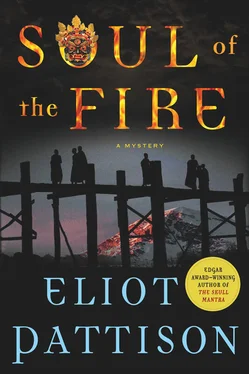Eliot Pattison - Soul of the Fire
Здесь есть возможность читать онлайн «Eliot Pattison - Soul of the Fire» весь текст электронной книги совершенно бесплатно (целиком полную версию без сокращений). В некоторых случаях можно слушать аудио, скачать через торрент в формате fb2 и присутствует краткое содержание. Год выпуска: 0101, ISBN: 0101, Издательство: St. Martin, Жанр: Полицейский детектив, на английском языке. Описание произведения, (предисловие) а так же отзывы посетителей доступны на портале библиотеки ЛибКат.
- Название:Soul of the Fire
- Автор:
- Издательство:St. Martin
- Жанр:
- Год:0101
- ISBN:9781250036476
- Рейтинг книги:4 / 5. Голосов: 1
-
Избранное:Добавить в избранное
- Отзывы:
-
Ваша оценка:
- 80
- 1
- 2
- 3
- 4
- 5
Soul of the Fire: краткое содержание, описание и аннотация
Предлагаем к чтению аннотацию, описание, краткое содержание или предисловие (зависит от того, что написал сам автор книги «Soul of the Fire»). Если вы не нашли необходимую информацию о книге — напишите в комментариях, мы постараемся отыскать её.
Soul of the Fire — читать онлайн бесплатно полную книгу (весь текст) целиком
Ниже представлен текст книги, разбитый по страницам. Система сохранения места последней прочитанной страницы, позволяет с удобством читать онлайн бесплатно книгу «Soul of the Fire», без необходимости каждый раз заново искать на чём Вы остановились. Поставьте закладку, и сможете в любой момент перейти на страницу, на которой закончили чтение.
Интервал:
Закладка:
Choi quickly introduced the others. “Miss Zhu,” she said with a nod to the young woman, then indicated the Tibetan. “Comrade Kolsang.” She nodded to the two men at the wall. “We are fortunate to be assisted by Major Sung and Comrade Tuan. And Miss Lin,” she added as an attractive young Chinese woman in a business suit entered the chamber, “manages our day-to-day needs.” Lin, whose high, rouged cheeks gave her the air of a courtesan, acknowledged Shan with a cool nod of her own.
“We are told you speak Tibetan,” Madam Choi continued, “and that you know the ways of the Buddhists.”
Shan impassively studied the strangers at the table. Just as the Tibetans had words and tones that signaled the beginning of one of their many rituals, so too did senior Party members. “If this is a tamzing, comrade,” Shan said, referring to the struggle sessions in which the subject confessed his sins against socialism, “I should have a pad and paper. Even better, a chalkboard. I once wrote ‘The Party is my Mother and Father’ five hundred times in thirty minutes.”
Kolsang, the Tibetan, grinned. Miss Zhu nervously looked down as if suddenly needing to examine the file in front of her. Major Sung’s head snapped up.
“No, Comrade Shan,” the woman replied in a patient voice. “This is no tamzing. And we call them self-criticism workshops now.”
Questions came in rapid-fire succession from both Chinese women. Had he indeed served a prison term in Lhadrung County? Had he once been a senior Beijing investigator assigned to the Council of Ministers? How many years had he served in his hard labor camp? Was it true that he had been rehabilitated sufficiently to be trusted with a position in the county government?
“Sufficiently trusted to be the ditch inspector for the northern district,” he clarified.
“A man of the people, then.” Choi folded her hands over the papers before her and looked at Kolsang, whose long face was raised toward Shan.
The Tibetan set his teacup down. “Would you by any chance be able to name the tashi targyel, comrade?” he tried.
Shan stared in surprise at the man, not understanding the trap he was surely being led into. “The Eight Auspicious Symbols are the Banner of Victory, the Knot of Eternity, the Lotus Flower, the White Conch Shell, the Golden Fishes, the Precious Parasol, the Treasure Vase, and the Wheel of Dharma,” he recited slowly.
Kolsang cocked his head. “And how many beads in a rosary?”
“One hundred eight.”
The Tibetan seemed to have his own rehearsed questions. “Why does the Wheel have eight spokes?” he asked, then, “In what direction do you walk a pilgrim’s circuit?”
“If you follow the old ways, then counterclockwise,” Shan began, “but most of the faithful will-”
“Enough!” the knob officer interrupted. Sung took a last drag on his cigarette, flung it into a wastebasket, and stood. The others instantly fell silent. The major paced along the table, studying Shan with a hungry stare. His face was like a hatchet.
“Who, Comrade Shan, are the New York Yankees?” he demanded in English.
Shan stared at Sung, more frightened than ever. “A team from American baseball,” he replied, also in English.
“Describe an American breakfast,” the major shot back.
“Bacon and eggs. Coffee, not tea.”
“Name five American presidents.”
“Washington, Jefferson, Adams, Lincoln.” Shan returned the man’s steady gaze. “Theodore Roosevelt. He kept wild animals in the presidents’ house.”
For the briefest instant, uncertainty flickered in the officer’s eyes. He studied Shan with the gaze of a predator. “Are you afraid of the dead, comrade?”
“I have more friends among the dead than the living.”
Sung’s smile was as cold as ice. He reached into a pocket and tossed a piece of red cloth in front of Shan. “The position of reformed criminal has been filled,” he announced, then pointed to the file in front of Shan before marching to the door. “Five minutes,” he stated, and stepped into the hall.
When Shan touched the cloth, the others took it as a signal. They all produced identical red swaths from their pockets and proceeded to slide them over their wrists. Armbands. Shan straightened the cloth to see the embroidered image of Lhasa’s Potala with the Western letters PICPO over it and the Chinese words for “PEACE AND ORDER” underneath. He hesitantly slid the band up his arm and opened the file.
On the left side was fastened a press announcement dated three months earlier, declaring in Chinese and English, the formation of the People’s International Commission for Peace and Order. The Commission, comprised of four citizens from China and three from the West, was “dedicated to eliminating the criminal acts of self-aggression that undermine harmonious coexistence in ethnic geographies.” Western members of the Commission, operating under the auspices of the United Nations, had arrived in Lhasa six weeks earlier. A larger photo showed the smiling Commission members posed on the steps of the Potala, the traditional seat of the Dalai Lama.
Clipped to the opposite side of the folder were two internal announcements in Chinese only. The first, dated the day before, reported that Deng Bao, the Administrator responsible for the smooth functioning of the Commission, had been called away by sudden illness in his family. Shan looked back at the photo, which listed names in the caption. Deng was a stout man with black-rimmed glasses. Deng’s interim replacement as Administrator would be Major Sung Xidan of Public Security, the announcement stated. The second report, from three days ago, announced the unexpected death from natural causes of Commissioner Xie. The opening created by the tragic loss of Commissioner Xie would be filled imminently, it said, so the Commission’s urgent and noble business would be undisturbed. Shan’s gut tightened as he read again the obtuse wording of the original press release. The Commission’s business was to eliminate the self-aggression that was undermining harmonious coexistence in ethnic geographies. It was the kind of code Beijing used when launching new political campaigns. Ethnic geographies meant the original provinces of Tibet. Undermining harmonious coexistence referred to Tibetan dissidents. The reference to self-aggression, he could not decipher.
He lifted the press release to find a folded piece of paper underneath, encasing three black-and-white photographs. The images were of another conference room, larger than the one he sat in and dominated by a table bearing a row of miniature international flags along its center. He glanced up at the air ducts at the corners of the room. The grainy photos had been taken by a camera near the ceiling and bore time and date stamps showing they were taken three days earlier. Public Security had been spying on the room. He glanced up nervously, realizing that someone had slipped a very unofficial secret into his official file. The first photo showed the Commissioners seated at the large table, all wearing the red armband. The second showed all but one of them rising so quickly their motions were blurred. The last figure-a slender man of mixed Tibetan and Chinese features, with long, thinning hair-remained seated, his head resting on his upraised hand as he stared emptily at the table. The third photo showed the others pushing to get through the door while Administrator Deng struggled to get inside. The balding man’s head had fallen to the table, his eyes still open.
Commissioner Xie had not simply died; he had died during a Commission meeting. Shan fingered his armband-Xie’s armband-with new foreboding. An anonymous hand had reached out to force Shan to replace the dead man.
Major Sung seemed interested in the way Shan stared at his file. He rose and was approaching Shan when Miss Lin nodded to someone outside the open door, then bent over Choi’s ear. The Chairman instantly stood and the other members of the Commission dutifully rose and followed her out of the room. The knob officer, his eyes lit with warning, motioned Shan to follow.
Читать дальшеИнтервал:
Закладка:
Похожие книги на «Soul of the Fire»
Представляем Вашему вниманию похожие книги на «Soul of the Fire» списком для выбора. Мы отобрали схожую по названию и смыслу литературу в надежде предоставить читателям больше вариантов отыскать новые, интересные, ещё непрочитанные произведения.
Обсуждение, отзывы о книге «Soul of the Fire» и просто собственные мнения читателей. Оставьте ваши комментарии, напишите, что Вы думаете о произведении, его смысле или главных героях. Укажите что конкретно понравилось, а что нет, и почему Вы так считаете.












